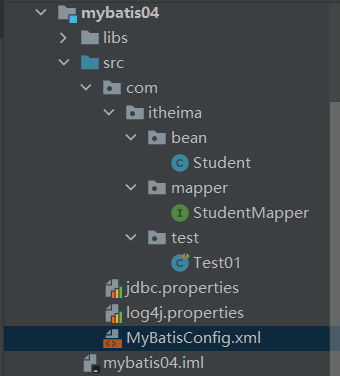MyBatis高级 注解开发
常用注解介绍
我们除了可以使用映射配置文件来操作以外,还可以使用注解形式来操作
常用注解
@Select(”查询的SQL语句“):执行查询操作注解
@Insert(”新增的SQL语句“):执行新增操作注解
@Update(”修改的SQL语句“):执行修改的操作注解
@Delete(”删除的SQL语句“):执行删除操作注解
注解实现查询操作
创建接口和查询方法
在核心配置文件中配置映射关系
编写测试类
注解实现新增操作
创建新增方法
编写测试类
注解实现修改操作
创建修改方法
编写测试类
注解实现删除操作
创建删除方法
编写测试类

StudentMapper
package com.itheima.mapper;
import com.itheima.bean.Student;
import org.apache.ibatis.annotations.Delete;
import org.apache.ibatis.annotations.Insert;
import org.apache.ibatis.annotations.Select;
import org.apache.ibatis.annotations.Update;
import java.util.List;
public interface StudentMapper {
//查询全部
@Select("select * from Student")
public abstract List<Student> selectAll();
//新增操作
@Insert("insert into Student values(#{id},#{name},#{age})")
public abstract Integer insert(Student stu);
//修改操作
@Update("update Student set name=#{name},age=#{age} where id=#{id}")
public abstract Integer update(Student stu);
//删除操作
@Delete("delete from Student where id=#{id}")
public abstract Integer delete(Integer id);
}
Test01
package com.itheima.test;
import com.itheima.bean.Student;
import com.itheima.mapper.StudentMapper;
import org.apache.ibatis.io.Resources;
import org.apache.ibatis.session.SqlSession;
import org.apache.ibatis.session.SqlSessionFactory;
import org.apache.ibatis.session.SqlSessionFactoryBuilder;
import org.junit.Test;
import java.io.IOException;
import java.io.InputStream;
import java.util.List;
public class Test01 {
@Test
public void selectAll() throws Exception {
//1.加在核心配置文件
InputStream is = Resources.getResourceAsStream("MyBatisConfig.xml");
//2.获取SqlSession工厂对象
SqlSessionFactory sqlSessionFactory = new SqlSessionFactoryBuilder().build(is);
//3.通过工厂对象获取SqlSession对象
SqlSession sqlSession = sqlSessionFactory.openSession(true);
//4.获取StudentMapper接口的实现类对象
StudentMapper mapper = sqlSession.getMapper(StudentMapper.class);
//5.调用实现类对象中的方法,接受结果
List<Student> list = mapper.selectAll();
//6.处理结果
for (Student student : list) {
System.out.println(student);
}
//7.释放资源
sqlSession.close();
is.close();
}
@Test
public void insert() throws Exception {
//1.加在核心配置文件
InputStream is = Resources.getResourceAsStream("MyBatisConfig.xml");
//2.获取SqlSession工厂对象
SqlSessionFactory sqlSessionFactory = new SqlSessionFactoryBuilder().build(is);
//3.通过工厂对象获取SqlSession对象
SqlSession sqlSession = sqlSessionFactory.openSession(true);
//4.获取StudentMapper接口的实现类对象
StudentMapper mapper = sqlSession.getMapper(StudentMapper.class);
//5.调用实现类对象中的方法,接受结果
Student stu=new Student(9,"王10",30);
Integer insert = mapper.insert(stu);
//6.处理结果
System.out.println(insert);
//7.释放资源
sqlSession.close();
is.close();
}
@Test
public void update() throws Exception {
//1.加在核心配置文件
InputStream is = Resources.getResourceAsStream("MyBatisConfig.xml");
//2.获取SqlSession工厂对象
SqlSessionFactory sqlSessionFactory = new SqlSessionFactoryBuilder().build(is);
//3.通过工厂对象获取SqlSession对象
SqlSession sqlSession = sqlSessionFactory.openSession(true);
//4.获取StudentMapper接口的实现类对象
StudentMapper mapper = sqlSession.getMapper(StudentMapper.class);
//5.调用实现类对象中的方法,接受结果
Student stu=new Student(9,"王11",40);
Integer update = mapper.update(stu);
//6.处理结果
System.out.println(update);
//7.释放资源
sqlSession.close();
is.close();
}
@Test
public void delete() throws Exception {
//1.加在核心配置文件
InputStream is = Resources.getResourceAsStream("MyBatisConfig.xml");
//2.获取SqlSession工厂对象
SqlSessionFactory sqlSessionFactory = new SqlSessionFactoryBuilder().build(is);
//3.通过工厂对象获取SqlSession对象
SqlSession sqlSession = sqlSessionFactory.openSession(true);
//4.获取StudentMapper接口的实现类对象
StudentMapper mapper = sqlSession.getMapper(StudentMapper.class);
//5.调用实现类对象中的方法,接受结果
Integer delete = mapper.delete(9);
//6.处理结果
System.out.println(delete);
//7.释放资源
sqlSession.close();
is.close();
}
}
MyBatisConfig.xml
<?xml version="1.0" encoding="UTF-8" ?>
<!--MyBatis的DTD约束-->
<!DOCTYPE configuration PUBLIC "-//mybatis.org//DTD Config 3.0//EN" "http://mybatis.org/dtd/mybatis-3-config.dtd">
<!--configuration 核心根标签-->
<configuration>
<!--引入数据库连接的配置文件-->
<properties resource="jdbc.properties"/>
<!--配置LOG4J-->
<settings>
<setting name="logImpl" value="log4j"/>
</settings>
<!--起别名-->
<typeAliases>
<package name="com.itheima.bean"/>
</typeAliases>
<!--environments配置数据库环境,环境可以有多个。default属性指定使用的是哪个-->
<environments default="mysql">
<!--environment配置数据库环境 id属性唯一标识-->
<environment id="mysql">
<!-- transactionManager事务管理。 type属性,采用JDBC默认的事务-->
<transactionManager type="JDBC"></transactionManager>
<!-- dataSource数据源信息 type属性 连接池-->
<dataSource type="POOLED">
<!-- property获取数据库连接的配置信息 -->
<property name="driver" value="${driver}" />
<property name="url" value="${url}" />
<property name="username" value="${username}" />
<property name="password" value="${password}" />
</dataSource>
</environment>
</environments>
<!--配置映射关系-->
<mappers>
<package name="com.itheima.mapper"/>
</mappers>
</configuration>
log4j.properties
# Global logging configuration # ERROR WARN INFO DEBUG log4j.rootLogger=DEBUG, stdout # Console output... log4j.appender.stdout=org.apache.log4j.ConsoleAppender log4j.appender.stdout.layout=org.apache.log4j.PatternLayout log4j.appender.stdout.layout.ConversionPattern=%5p [%t] - %m%n
jdbc.properties
driver=com.mysql.jdbc.Driver url=jdbc:mysql://192.168.23.129:3306/db3 username=root password=root
注解开发小结
注解可以简化开发操作,省略映射配置文件的编写。
常用注解
@Select(”查询的SQL语句“):执行查询操作注解
@Insert(”新增的SQL语句“):执行新增操作注解
@Update(”修改的SQL语句“):执行修改的操作注解
@Delete(”删除的SQL语句“):执行删除操作注解
配置映射关系
<mappers>
<package name="接口所在包"/>
</mappers>



